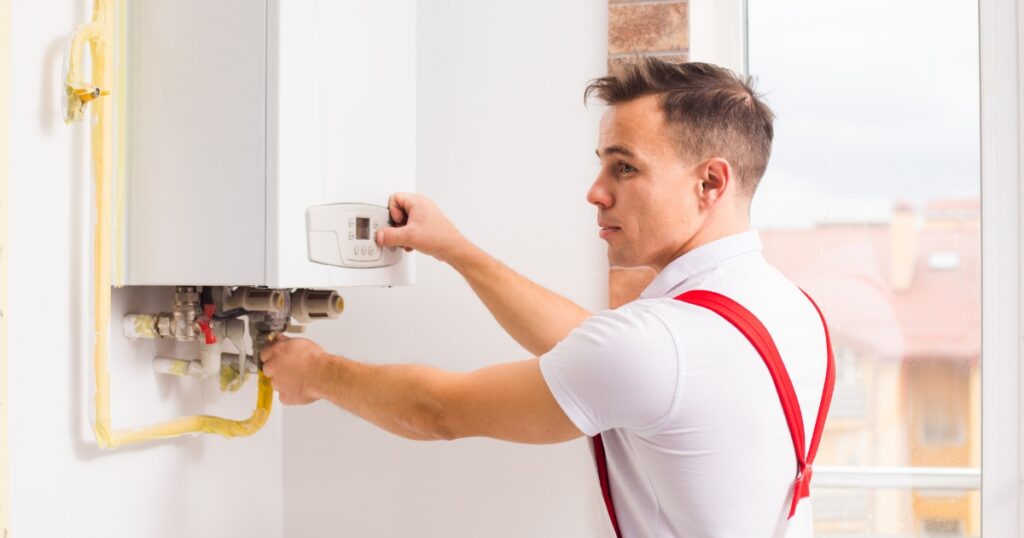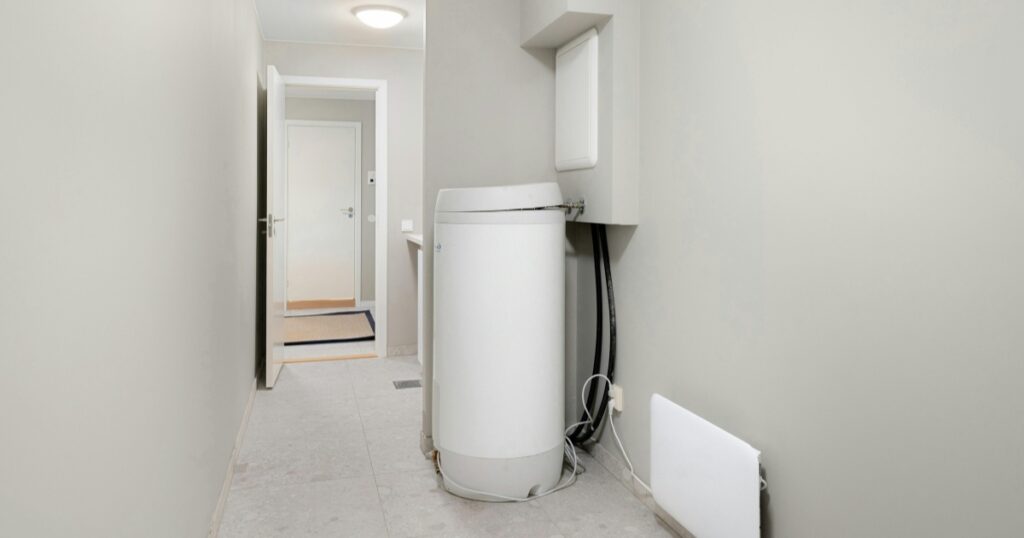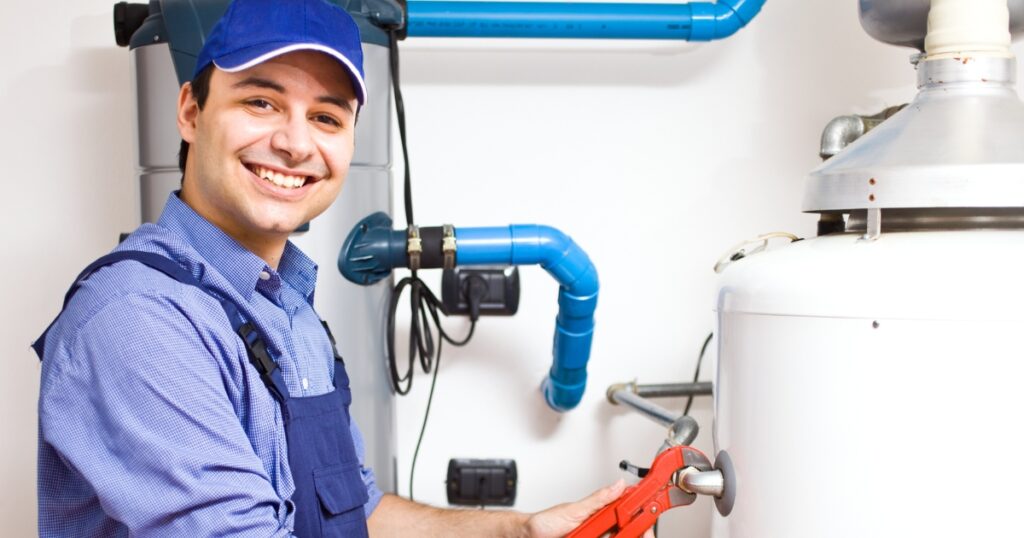Struggling with your hot water not coming through as it should? You’re not alone, mate. After a fair bit of digging around, we discovered that dodgy pressure regulators are often the culprits.
This blog is going to show you how to work out if it’s time to fix or flick your hot water system’s pressure regulator and what steps to take next. Get ready for your hot water to be flowing just right again!
Key Takeaways
- Diagnosing the problem with your hot water pressure involves checking valves and the pressure regulator for damage or malfunctions. Doing this early helps avoid bigger issues.
- Regular maintenance, such as flushing out sediment and cleaning fixtures, plays a huge role in keeping your hot water system running efficiently.
- Replacing a faulty pressure regulator can restore proper hot water pressure. It’s important to follow specific steps like turning off the power and water supply before starting this task.
- If you’re facing persistent issues like significant leaks or no hot water at all, it might be time to call in a professional plumber for help.
- Keeping an eye on symptoms like low water pressure, odd noises, and visible rust will let you take action quickly and potentially save on costly repairs down the line.

Common Hot Water Service System Problems
Experiencing low hot water pressure, unexplainable and odd noises, water leaks, and rusty components are common issues with hot water systems. To address these problems effectively, understanding the signs that indicate the need for repair or replacement is essential.
Low hot water pressure
We often face low hot water pressure issues in our homes, which can stem from partially closed valves, a failing pressure regulator, or even hidden leaks. Identifying the cause early helps us avoid the inconvenience of not having enough hot water, especially during those chilly mornings.
Checking for faulty valves and ensuring no concealed leaks are present are crucial first steps we take.
Fixing a malfunctioning water pressure valve plays a significant role in resolving low hot water pressure problems. We also look into replacing a sticky or leaking water heater pressure relief valve to restore the system’s efficiency.
Regular maintenance and timely repairs prevent costly damages down the line, keeping our hot water running smoothly.
Unexplainable and odd noises
Odd noises coming from your hot water system can be an indication of underlying issues. These sounds could be caused by sediment buildup, loose heating elements, or a failing pressure regulator.
The buildup of mineral deposits in the tank can create banging or popping noises during the heating process. Additionally, a faulty pressure regulator may cause whistling or humming sounds.
Addressing these unexplainable noises promptly is essential to prevent further damage and ensure the efficient operation of your hot water system.
If left unresolved, these odd noises could lead to more significant problems such as leaks and decreased efficiency in heating water. Checking for unusual sounds regularly and addressing them early on can save you time and money by preventing potentially costly repairs down the line.
Water leaks
Water leaks can lead to significant damage to your hot water system, causing rust and corrosion which could require costly repairs or replacements. Leaks in the main water line pressure regulator valve or from a screw indicate potential issues with the water pressure regulator.
Addressing any leaks promptly is crucial to maintaining the efficiency of your hot water system and preventing further damage. Regularly inspecting for and fixing any leaks will help you avoid more extensive problems down the line.
Repairing a leaking pressure-reducing valve requires attention to detail and often involves involving a professional plumber who has experience working with hot water systems. It’s important to address any leaking immediately as it can affect both the lifespan of your hot water service and its functionality, potentially leading to additional maintenance costs if left unchecked.
Faulty drain valve
A faulty drain valve on your hot water system can lead to water leaks and low hot water pressure. Leaks from the drain valve may indicate a problem with the tank’s integrity or result in water wastage, driving up utility costs.
Additionally, a malfunctioning drain valve could lead to sediment buildup in the tank, causing poor heat transfer and efficiency issues within the hot water system.
No water pressure
If you notice no water pressure in your hot water system, it could be due to a faulty or failing pressure regulator. This may lead to a complete lack of hot water or a noticeable decrease in pressure.
It’s important to address this issue promptly as low or no water pressure can result in inconvenience and costly damage.
A failing pressure regulator is one of the common causes of low water pressure. The symptoms may include leaking from the screw and main water line pressure regulator valve, which can compromise the efficiency of your hot water system.
Rust
If you notice any signs of rust or corrosion on your hot water system, it’s crucial to address the issue promptly. Rust can lead to leaks and decreased efficiency in your hot water system.
Over time, rusty components can cause irreversible damage, leading to costly repairs or even a complete replacement of the unit. Regular maintenance and checks for rust will help you catch any potential problems early on and prevent further damage to your hot water system.
To maintain the efficiency of your hot water system, keep an eye out for any signs of rust or corrosion. A pressure-regulating valve that shows signs of rust should be promptly inspected and potentially replaced by a professional plumber to ensure smooth operation.
Signs That You Need To Repair or Replace Your Hot Water System
If your hot water system is aging, showing signs of rust or corrosion, leaking, experiencing low pressure, or clogged faucets, it may be time to consider a repair or replacement. These signs indicate potential issues that need attention to maintain the optimal performance of your hot water system.
Consider its age
The age of your hot water system is a crucial factor to consider when assessing whether it needs repair or replacement. Over time, wear and tear can lead to the deterioration of key components such as pressure regulators and valves, resulting in diminished performance and potential leaks.
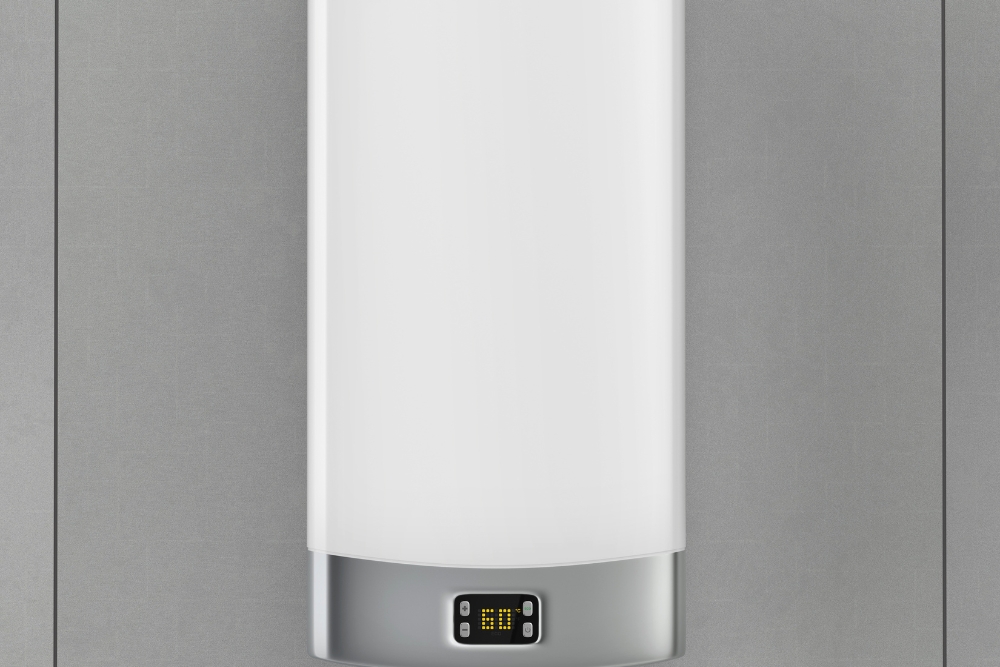
As systems age, they may also become less energy-efficient, leading to increased utility costs. Therefore, if your hot water system is reaching its typical lifespan of 10-15 years or showing signs of aging such as rust or corrosion, it may be time to consult a professional for an assessment.
Regular maintenance becomes especially important as a hot water system ages. Neglecting issues related to an older system can result in more significant problems down the line that are costlier to fix.
Rust or corrosion
Consider its age when inspecting your hot water system for signs of rust or corrosion. Over time, the metal components can start to deteriorate, leading to rust and corrosion within the system.
This deterioration can weaken the structural integrity of the unit and cause leaks, low hot water pressure, and potential water damage. Regularly checking for rust or corrosion is essential in maintaining the efficiency and longevity of your hot water system.
To avoid costly repairs or replacements due to extensive rust or corrosion, it’s crucial to address any signs early on. Look out for discoloured patches or flaking on metal surfaces as indicators of potential issues with rust or corrosion that may require immediate attention from a professional service technician.
Leaks
Leaks in the hot water system are a common indicator of potential issues with the pressure regulator or other components. Water leaking from the main water line pressure regulator valve or screw can lead to reduced hot water pressure and may indicate a need for repairs.
A leaking pressure-reducing valve not only affects the efficiency of your hot water system but also poses the risk of costly water damage if left unaddressed. It is crucial to promptly attend to any leaks in your hot water system, as they could be symptomatic of larger problems that require professional attention.
Addressing leaks in your hot water system can prevent further damage and ensure that you have consistent access to properly pressurised hot water when needed. If you notice any signs of leakage, it’s important to seek assistance from a qualified plumber experienced in hot water system maintenance and repairs.
Low water pressure
Low hot water pressure is often a sign of a faulty valve or failing pressure regulator. It can also be caused by sediment or scale buildup in the system, resulting in restricted water flow.
If you notice a significant drop in your hot water pressure, it’s crucial to address the issue promptly to prevent further damage and inconvenience.
Faulty water pressure regulators can lead to insufficient hot water pressure, affecting the efficiency of your hot water system. Additionally, sediment and mineral buildup can restrict the flow of hot water through your pipes and fixtures.
Clogged or evaporative-activated faucet
If you notice low hot water pressure in your home, a clogged or evaporative-activated faucet could be the culprit. Sediment and mineral buildup can block the flow of water through the faucet, leading to reduced water pressure.
To fix this issue, try cleaning the faucet aerator by unscrewing it from the spout and soaking it in vinegar to remove any deposits. Additionally, consider using a strainer on faucets to prevent debris from entering and causing clogs.
If you suspect that a faulty pressure regulator is causing low hot water pressure in your home, start by checking for sediment or mineral buildup in the faucet aerators before replacing any parts.
How To Fix Low Hot Water Pressure
Diagnose the problem to identify the cause of low hot water pressure. Clean fixtures and flush out sediment and scale to improve water flow. Replacing a faulty pressure regulator can help restore proper water pressure in your hot water system.
Diagnosing the problem
To diagnose the problem of low hot water pressure, begin by checking for any partially closed valves in the plumbing system. Ensure that all the control valves leading to and from the hot water service are fully open.
Next, inspect the pressure regulating valve for any signs of damage or malfunction. Look for leaks around the valve as well as rust or corrosion, which can indicate a faulty regulator.
Additionally, testing the thermostat settings on your hot water system can help identify if there is an issue with temperature regulation affecting water pressure.
Possible reasons for low-pressure
Low hot water pressure can be due to various reasons that need to be addressed promptly. Here are potential causes for low hot water pressure:
- Sediment Build-Up: Sediment and mineral deposits can accumulate in the water heater, causing blockages and reducing water flow.
- Corroded Pipes: Corrosion within pipes can restrict the flow of hot water and lead to lower pressure in the system.
- Faulty Pressure Regulator: A malfunctioning or worn-out pressure regulator can fail to maintain the correct water pressure, resulting in low hot water pressure.
- Leaks in the Plumbing System: Undetected leaks within the hot water system or supply pipes can lead to reduced water pressure.
- Inadequate Pipe Size: If the diameter of the pipes is too small, it can hinder the smooth flow of hot water, resulting in low pressure.
- Closed Valves: Partially closed valves within the hot water system or at individual fixtures can restrict the flow of hot water, leading to decreased pressure.
- Water Supply Issues: External factors such as issues with municipal supply lines or a problem with the main shut-off valve could contribute to low hot water pressure.
Checking and cleaning fixtures
To ensure optimal hot water pressure, it’s important to regularly check and clean fixtures. This helps maintain a steady flow and prevents any potential blockages or obstructions. Here are the essential steps to check and clean your fixtures:
- Inspect all faucets for any visible debris, mineral buildup, or corrosion.
- Remove aerators and showerheads to clean out sediment or mineral deposits that may be hindering water flow.
- Use a mild cleaning solution to scrub fixtures and remove any accumulated grime or build-up.
- Check for any leaks around the base of the fixtures, as this could indicate a potential issue that needs addressing.
- Test the water pressure at each fixture to ensure consistent flow throughout your plumbing system.
- Regularly monitor and address any issues promptly to prevent them from escalating into more significant problems.
Keeping your fixtures clean is crucial in maintaining an efficient hot water system and ensuring a steady flow of hot water throughout your home.
Flushing out sediment and scale
To maintain the efficiency of your hot water system, flushing out sediment and scale is crucial. Over time, mineral deposits can build up in the tank, affecting its performance. Here’s how to do it:
- Turn off the power or gas supply to the water heater.
- Attach a hose to the drain valve at the base of the tank and place the other end in a suitable drainage area.
- Open the pressure relief valve and then open the drain valve to allow water to flow out.
- Let the water drain for about 5 – 10 minutes or until it runs clear.
- Close the drain valve and remove the hose, ensuring that it is securely closed.
- Turn on a hot water tap in your home to allow air into the tank as it refills.
- Once all air is bled from the system and water flows freely from the tap without sputtering, turn off the tap.
By regularly flushing out sediment and scale from your hot water system, you can help prevent issues with low pressure and maintain optimal performance.
Replacing a faulty pressure regulator
When replacing a faulty pressure regulator, it is important to take into consideration the following steps:
- Turn off the power supply to the hot water system and shut off the water supply to avoid any accidents or further damage.
- Disconnect the pressure regulator from the hot water system by unscrewing it carefully, ensuring not damage any surrounding components.
- Install the new pressure regulator by connecting it securely to the hot water system and adjusting it according to the manufacturer’s instructions.
- Turn on the water supply and power, then test your hot water pressure to ensure that the replacement has resolved the issue.
- Monitor your hot water system for any leaks or irregularities after replacing the pressure regulator.
Following these steps will help ensure the efficient operation of your hot water system without further issues.
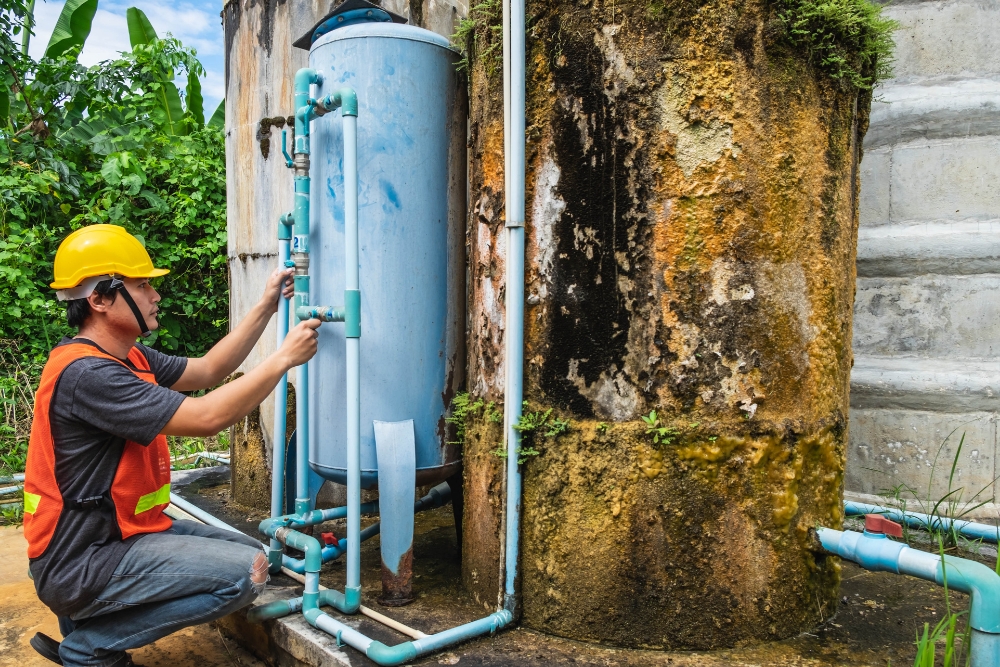
When To Call A Professional Plumber
When your hot water system displays persistent issues like low pressure, odd noises, or leaks that are beyond simple DIY fixes, it’s time to call a professional plumber. Professional plumbers have the expertise to diagnose and address complex hot water system problems effectively, ensuring your system operates efficiently.
Understanding your hot water system
Understanding your hot water system is crucial for identifying potential issues. Regularly check the thermostat settings and pressure valves to ensure they are functioning correctly.
If you notice a lack of hot water or low pressure, it could be due to a failing pressure regulator or concealed leaks. Familiarise yourself with the symptoms of water pressure regulator failure, such as leaking from the screw and main water line pressure regulator valve.
Keep an eye out for odd noises or rust, as these can indicate underlying problems in your hot water system.
Testing your hot water pressure
To test your hot water pressure, start by turning on the hot water at a sink or shower. Use a pressure gauge to measure the water pressure and compare it to the recommended level for your system.
If the pressure is significantly lower than it should be, you may have an issue with your pressure regulator or another component of your hot water system. It’s important to address this promptly as low hot water pressure can indicate underlying problems that need attention from a professional plumber.
Checking the hot water pressure regularly allows you to catch any issues early and prevent potential damage to your hot water system. By testing your hot water pressure, you can ensure that everything is functioning as it should and take action if necessary, maintaining a steady flow of warm water throughout your home.
Signs you need professional help
If you notice a complete lack of hot water or a noticeable decrease in pressure, it could be due to a failing pressure regulator. Symptoms such as low hot water pressure and unexplainable noises are indicators that your hot water system needs professional attention.
Additionally, leaks from the main water line pressure regulator valve or screw can also signal the need for expert help with your hot water system.
Ignoring symptoms of faulty pressure regulators and low hot water pressure can lead to costly damage to your hot water system. It’s important to address these issues promptly by seeking professional assistance from plumbers or electricians experienced in repairing or replacing faulty pressure regulators in hot water systems.
Your Comfort, Our Swift Hot Water Restoration!
Maintaining an efficient hot water system is crucial for every homeowner. Identifying and addressing issues such as low water pressure, odd noises, or leaks promptly can prevent costly damage.
From diagnosing the problem to knowing when to call a professional plumber, taking timely action can help in avoiding complete failure of the hot water system. Keep an eye out for signs of faulty pressure regulators and address them promptly to ensure your home’s hot water service runs smoothly.
Is your hot water system experiencing issues with pressure regulation? Don’t let faulty pressure regulators disrupt your daily routine. Turn to Hot Water Repairs Today for swift and effective solutions.
Our expert technicians specialise in diagnosing repairing or replacing faulty hot water service pressure regulators. Whether it’s erratic water pressure, leaks, or other pressure-related issues, we have the expertise to address them efficiently.
Don’t compromise on your comfort and safety. Trust Hot Water Repairs Today to restore proper pressure regulation to your hot water system. Contact us now to schedule a service and enjoy consistent water pressure once again.



